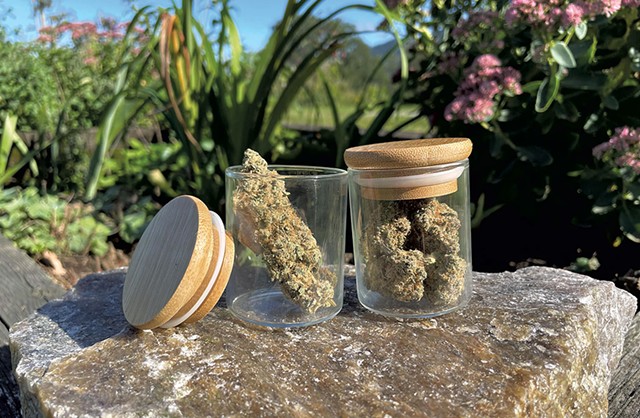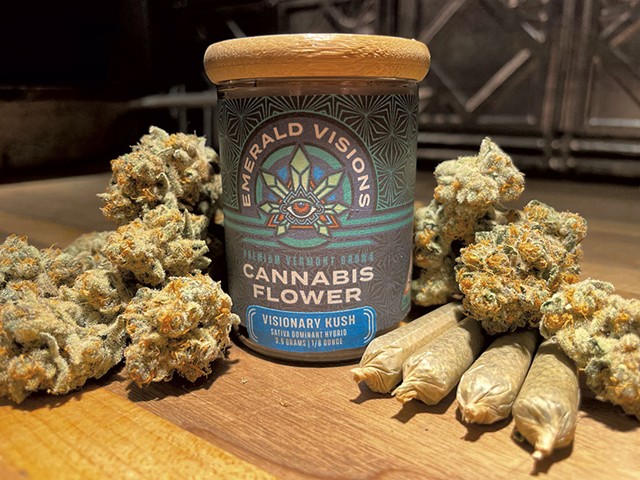
- Courtesy
- Old Growth Vermont is considering selling its cannabis flower in glass jars with bamboo lids.
When people can finally buy weed legally in Vermont, beginning on October 1, their precious buds will arrive in glass, metal or cardboard containers — but not plastic. That's how state lawmakers wanted Vermont-grown grass to be sold, given the bad environmental rap the cannabis industry has earned in other states.
That laudable goal may nevertheless prove challenging for regulators to administer and costly for producers to meet.
"Plastic is convenient. Plastic is cheap. Plastic is what we're used to as a society," Kyle Harris, a member of the state's Cannabis Control Board, said. "But this is an area that we're trying to be a leader in."
Cannabis growers, manufacturers and retailers are still wrapping their heads around the numerous packaging regulations as they scramble to secure appropriate containers for their products. Some support the plastics ban, saying it will help burnish the local industry's reputation for sustainability.
The national industry's intensive energy use, pattern of soil pollution and embrace of single-use plastics pose significant environmental issues, and Vermont has a chance to set its nascent industry on a more sustainable course, said Jesse McFarlin, cofounder of Old Growth Vermont, a small licensed outdoor grower in Brownsville.
"At this point, it's no secret to people in the cannabis community that the industry is gross when it comes to waste," McFarlin said.
Others are less stoked about the rules, calling them a huge hassle and predicting unintended consequences.
Nick Smith, founder of Emerald Visions in Alburgh, worries that glass containers, such as the "doob tubes" that joints come in, will wind up shattered on sidewalks.
"At least with plastic, it's not going to end up as shards of glass in a dog's paw," Smith said.
And if cutting down on plastic use is the goal, making growers buy glass jars that come nestled in bubble wrap — which is not easily recyclable — strikes Smith as painfully counterproductive.
He recently weighed the Styrofoam and bubble wrap that surrounded 40 glass jars he purchased and found that the packing was heavier than the same number of Mylar bags, which are made of a type of plastic.
"So you tell me which uses less plastic," he said.
Vermont's decision to ban plastic packaging grew out of a realization that the single-use plastic jars and tubes ubiquitous in other states are both wasteful and often unnecessary, Harris explained.
They're made from fossil fuels, and studies show that only a fraction of the plastic is recycled, he said. Cannabis packaging is particularly challenging; due to concerns about residue, most recycling programs will not accept it.
Single-use containers became the norm in other states largely out of safety concerns, with lawmakers requiring child-resistant containers, Harris explained. In some cases, such as edibles that a child could ingest, the concern is valid, but in many others, such as cannabis flower, it is not, he said.
Eating a small amount of raw cannabis doesn't pose an overdose risk. That's because THC, the psychoactive chemical in pot, is only created when cannabis is heated through a process called decarboxylation. This can be achieved through smoking, vaping or — in the case of edibles — baking the cannabis. Without it, pot is essentially inert, Harris said.
That's why lawmakers allowed the Cannabis Control Board to use a lower safety standard of child-deterrent packaging for cannabis flower. This standard — the first in the nation — is defined as "tear-resistant packaging that can be sealed in a manner that would deter a child under five years of age from easily accessing the contents of the package within a reasonable time and not difficult for adults to use properly."
Edibles still must be sold in the more difficult-to-open, child-resistant packaging.
James Pepper, chair of the Cannabis Control Board, acknowledged last week that the packaging rules were complicated but said they are in place "so we don't have to rely on heavy-duty, nonrecyclable, nonreusable, single-use plastic jars and lids for flower."

- Courtesy
- Emerald Visions cannabis in glass packaging
The board has issued guidance to the industry but doesn't need to sign off on whether a package is sufficiently child deterrent, he said.
"We'd like people to use some common sense here," he said.
To date, 61 cannabis producers have sought exemptions from the no-plastic rule, an indication of how challenging it is. The board has approved just four. Many requesting waivers claim they can't find a suitable nonplastic option.
The solutions can be simple.
"You can get 32 eight-ounce or 12-ounce mason jars at Ace hardware," Harris said. "That would comply for flower."
All the options can prove overwhelming for some growers.
When McFarlin of Old Growth Vermont first started trying to figure out how her company could comply, it was, she said, "like falling down a wormhole." Even though recyclable and reusable packaging aligns with the company's values, pulling it off has proven challenging.
"I am supportive and find it frustrating," McFarlin said.
The cannabis supply infrastructure is heavily invested in plastic packaging products, and sustainable options are far fewer and substantially more expensive.
The three-ounce glass jars with bamboo tops that she and her cofounders are considering using cost $1 each; a similar plastic jar is 20 cents. The jars with metal lids and aluminum tubes for pre-rolled joints have similar premiums compared to their plastic counterparts.
The cost is concerning, but so is the world's widespread plastic pollution, McFarlin said. Instead of griping about the burdens posed by the regulations, she and her partners have chosen to embrace sustainable packaging and its many environmental benefits.
"The fact of the matter is, someone had to make a move, and the Cannabis Control Board decided to be that somebody," she said.
Jane Lanza, co-owner of Family Tree Hemp in Sheldon, wonders whether the effort and expense are worth the benefits. When a box of glass tubes shattered on a floor at her farm where her kids play, she started to question the wisdom of the program, she said.
"I suppose it's a noble effort from a point of view, but it's restrictive, and there are some cases where it just becomes illogical," Lanza said.
Educating growers and retailers about the rules, helping them comply, and deciding whether to grant waivers has been challenging, Harris acknowledged.
Some people asking for waivers make good counterarguments, such as requests to use containers made from recycled ocean plastic. While laudable, Harris said the board must weigh other factors, such as whether that's something Vermont wants to put in its sole remaining landfill.
Whether to allow bioplastics is another complex question. Industrial composters in Vermont such as the Chittenden Solid Waste District no longer accept plant-based utensils and food containers for composting. The containers the board has granted waivers for would have to be composted at home. One of the products that received a waiver, biodegradable lids by a company called Humidi.co, can take 18 months to break down in a backyard composter, according to its maker.
That means many people will likely toss the lids in the garbage. The waiver still makes sense, Harris argues, because the material it is made from, known as PHA, breaks down in landfills faster than petroleum-based plastic and without producing harmful chemicals, he said.
Other states and industry players are watching the rollout of Vermont's plastic ban closely. While some licensees are frustrated, most see the value of the state raising the bar, he said.
"Vermont is about small, craft, environmentally conscious products," he said, "and this is an opportunity for us to showcase that for the rest of the country."













Comments
Comments are closed.
From 2014-2020, Seven Days allowed readers to comment on all stories posted on our website. While we've appreciated the suggestions and insights, right now Seven Days is prioritizing our core mission — producing high-quality, responsible local journalism — over moderating online debates between readers.
To criticize, correct or praise our reporting, please send us a letter to the editor or send us a tip. We’ll check it out and report the results.
Online comments may return when we have better tech tools for managing them. Thanks for reading.